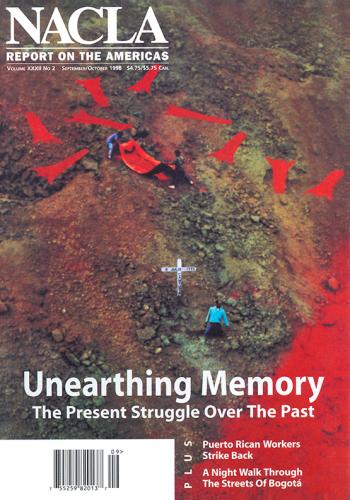Report
Nothing indicated that the Chilean postdictator.ship would be a time of forgetting. Nothing prepared us for the sustained attack against the memory of the crimes of the past launched by the elites who now hold power. Duritig the dictatorship, in fact, the cult of remembering was ever-present, for it fed the passion of struggle.
On April 26, 1998, just two days after publicly presenting the final report of the Recovery of Historical Memory (REMHI) Project, Bishop Juan Gerardi, who headed the project, was assassinated outside his home. The REMHI is an unprecedented effort led by the Catholic Church to document the atrocities committed during Guatemala's 36-year civil war.
Chile, Obstinate Memory (1997) is a film about the fractured biographical narratives of those whose lived experiences have been erased from public memory in postdictatorship Chile.[1] The film was directed by Patricio Guzmán, who also directed The Battle of Chile, the three-part documentary which chronicles the last ten months of the Popular Unity government, culminating with the September 1973 coup.
Processes of democratization after military dictatorships are not easy or smooth.[1] With democratic mechanisms more or less in place in most Latin American countries—at least at a procedural level—the challenge now is to develop "deep" modes of democracy.
As repressive regimes fade, questions about the past are often central to the politics of the present. Human rights leaders throughout the world have argued that reconciliation and recovery depend on confronting the state crimes of the past, and that a silenced past will lead to bitterness and simmering conflict.
On April 22, 1997, military commandos burst into the residence of the Japanese ambassador to Peru, where rebels of the Tupac Amaru Revolutionary Movement (MRTA) were holding 72 hostages. The surprise attack began at 3:15 in the afternoon while the MRTA leaders, including top commander Néstor Cerpa Cartolini, were playing a relaxing game of soccer inside the diplomatic compound.

